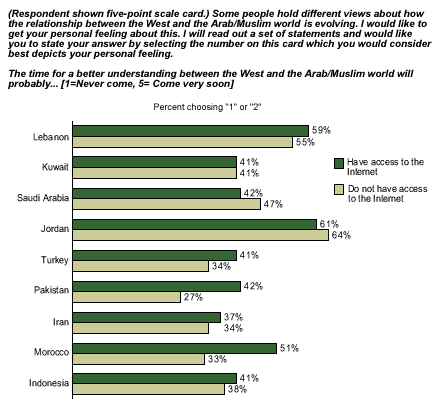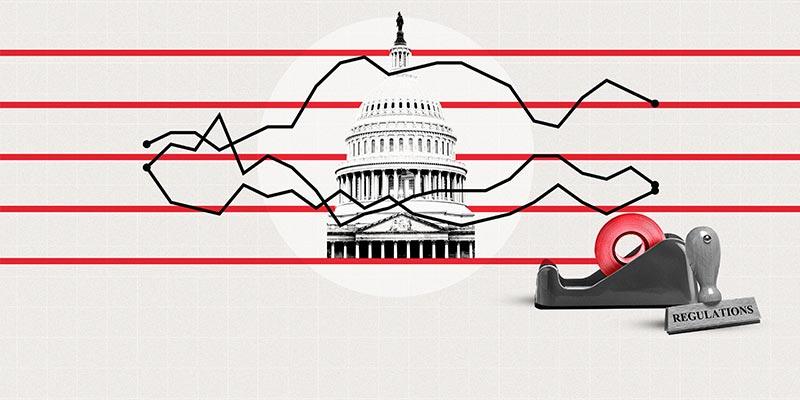One unmistakable conclusion of Gallup's recent poll of nine predominantly Islamic countries is that residents of those countries have largely negative views of the Western world, and the United States in particular. One proposed strategy to improve attitudes toward the West in this part of the world is to increase the exposure of its residents to Western cultures and ideas. What can Gallup's study tell us about the potential success of such a strategy?
The results suggest that many living in the Islamic world who currently have some exposure to the West, rate the United States and other Western countries slightly more positively than do those without such exposure. However, the data also show that in several countries, those with exposure to Western culture are more pessimistic than the general population that Western and Islamic countries can ever reach a better level of understanding.
Exposure to the Western World
The poll assessed several avenues through which residents of predominantly Islamic countries may have exposure to Western culture and ideas.
When respondents were asked if they personally know someone who emigrated to the West from their region, the results varied widely, from 97% in Lebanon to 27% in Pakistan. Majorities of residents in Lebanon, Jordan and Iran said they know a person who moved to a Western country.
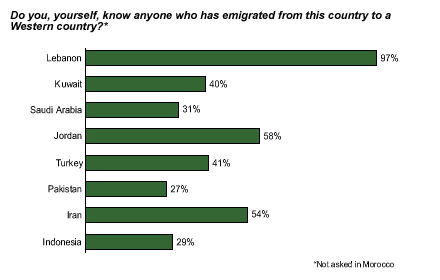
The poll also asked respondents if they have access to the Internet, either at home or at work. In general, Internet access is not widespread in the Islamic world; the highest level is just 35% in Kuwait. Pakistanis are least likely to be online, at 10%. The poll also asked respondents whether they rely on Western media outlets for news, but very few residents of these countries do so.
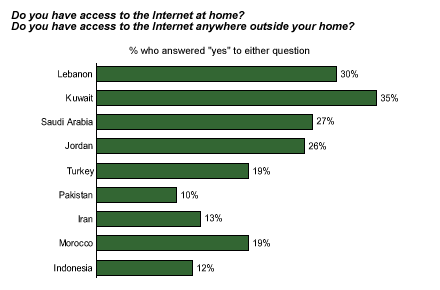
Exposure to Western Culture Garners More Positive Responses
The different forms of these various "windows to the West" generally have the same effect -- those with exposure to Western culture are more positive about the West than those without such exposure. However, the effects are quite modest, and even those with such exposure are more likely to feel negatively than positively toward the West.
The effects are most evident in respondents' ratings of individual Western countries. In five of the eight predominantly Islamic countries in which the question was asked, those who know someone who emigrated to the West rate the United States more positively than do those who do not. Nevertheless, in all those countries, even those who know such an emigrant are more likely to hold an unfavorable view of the United States than a favorable one.
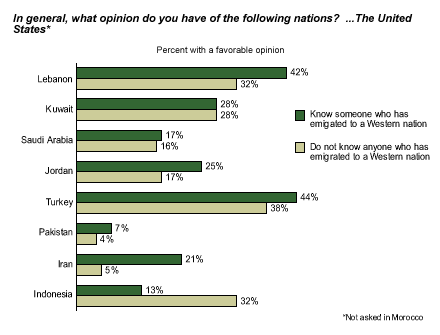
The effect is strongest in Iran, where those who know an emigrant to the West are four times more likely to rate the United States positively than those who do not -- though even among this group, views of the United States are still overwhelmingly negative. The effects of knowing someone who has moved to the West are much less dramatic in the other countries.
In six of the nine countries studied, those with Internet access are significantly more likely to say they have a favorable opinion of the United States than those without. This effect is most apparent in Iran and Jordan. Similar relationships are found in ratings of France and Great Britain.
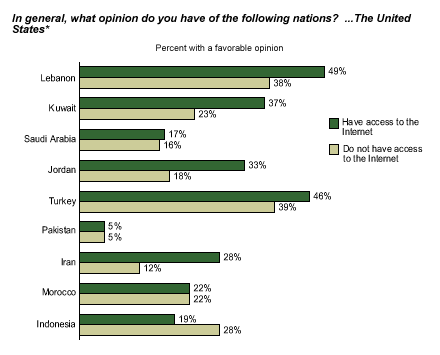
With regard to specific attributes, those with some exposure to the West are more likely to believe that Western nations as a whole "care about poorer nations," "treat minorities living in their countries fairly," and maintain "equality for their citizens regarding rights and duties." However, there is no difference in how residents of Islamic countries with or without exposure to the West rate Western nations on "respecting Arab/Islamic values," taking a "fair stance toward Arab/Muslim countries," or taking a "fair stance on the situation in Palestine."
Not All Effects Are Positive
On a few items, exposure to the West actually seems to affect respondents' attitudes negatively. Specifically, those with Internet access or those who know a person who has emigrated to the West are more pessimistic with regard to whether Western nations and the Islamic world will ever understand each other better. In six of the nations, especially in Pakistan and Morocco, those with Internet access are more pessimistic than those without that a better understanding between the cultures will ever come.
